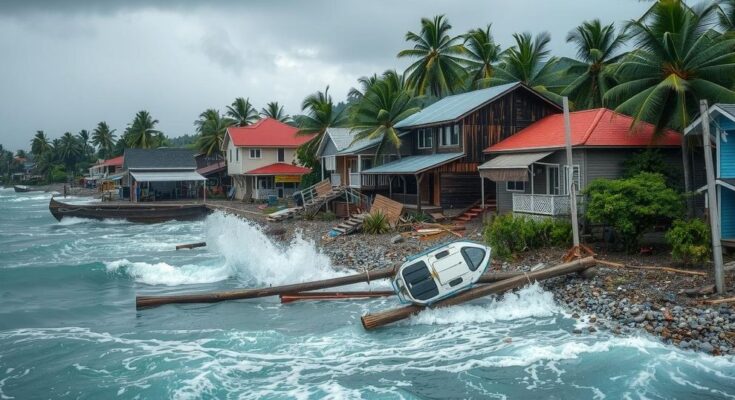Tropical Cyclone Chido struck Mayotte on December 14, 2024, classified as a category 4 equivalent cyclone, leading to at least two fatalities and extensive destruction, particularly in the capital city. Authorities issued severe weather alerts, closed airports, and converted schools into shelters. The cyclone is projected to affect nearly 2.7 million people across its path, underscoring the region’s vulnerability to extreme weather events.
On December 14, 2024, Tropical Cyclone Chido made its calamitous landfall on Mayotte, a French territory in the Indian Ocean, classified as a category 4 equivalent cyclone. Reports indicate that the tempest has caused at least two fatalities alongside widespread devastation across the island, with the capital city suffering extensive destruction. Local authorities elevated the threat level, advising all residents, including emergency personnel, to seek immediate refuge as winds approached speeds of 180 to 230 km/h (112 to 143 mph).
In response to the cyclone’s impact, the regional government took swift action by converting approximately 70 schools and gyms into temporary shelters for the displaced population, numbering around 320,000 residents. The infrastructure challenges were significant, with electric poles downed and roofs ripped off homes, further compounding the rough situation on the island. Air traffic was halted, and road travel was banned as the cyclone progressed, though conditions were forecasted to improve by late Saturday.
The storm’s fierce characteristics were evidenced by its symmetrical eye observed early on December 14, indicative of a highly organized and intense weather phenomenon. Moreover, favorable atmospheric conditions, including warm sea surface temperatures between 29–30 °C (84–86 °F) and low vertical wind shear, likely contributed to the cyclone’s sustained strength. Wind speeds were ultimately estimated at 222 km/h (138 mph), with predictions of continued northwestward movement and further impacts anticipated in neighboring regions, including Mozambique and Madagascar.
Chido’s reach is projected to affect approximately 2.7 million individuals across six countries, increasing concern for ongoing humanitarian repercussions. As local responses continue and recovery efforts unfold, the enormity of the cyclone’s damage underscores the growing threat posed by such extreme weather events in vulnerable regions.
Tropical Cyclone Chido represents one of the most severe weather events in recent history for Mayotte, which lies in the Indian Ocean. Cyclones of such intensity are relatively rare, with Chido marked as the most destructive cyclone to hit the region since 1934. Given the island’s geographical location, it is often exposed to tropical storms, yet the impact of Chido emphasizes the pressing necessity for disaster preparedness and effective response strategies in the face of climate-induced weather extremes. Authorities had to swiftly mobilize resources and secure shelters to mitigate human suffering from the storm’s violent consequences, showcasing the vital interplay between weather phenomena and community resilience.
In summary, Tropical Cyclone Chido has inflicted unprecedented devastation on Mayotte, highlighting not only the ferocity of such natural disasters but also the urgent need for robust disaster preparedness systems. As the storm moves towards other regions, it is anticipated to impact millions across multiple countries. The resulting humanitarian crisis demands immediate attention and aid to support the communities affected by the cyclone’s catastrophic effects.
Original Source: watchers.news




